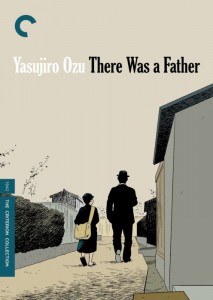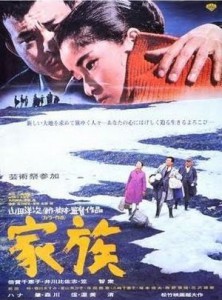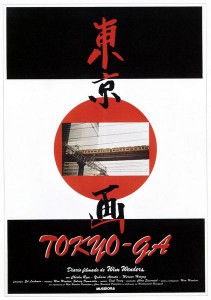
A father and his son, a son and his father. Horikawa is a widower, a teacher, and a good father to Ryohei, who’s about 10. After a tragedy, Horikawa resigns from teaching and takes Ryohei from Tokyo to the town of Ueno, enrolling him in junior high; to the lad’s sorrow, he will be a boarder. Horikawa returns to work in Tokyo, their separation is complete. Jump ahead more than ten years: with dad’s help, Ryohei has finished college and has a teaching job in Akita. Horikawa considers living with his son, which Ryohei wants, but the elder’s notions of duty and hard work preclude it. Ryohei arranges a ten-day vacation with his father. Heartbreak comes quietly, nearly hidden by dignity.
Read More »
Tag Archives: Chishû Ryû
Kazoku / Where Spring Comes Late (1970) Yôji Yamada, Chieko Baishô, Hisashi Igawa, Chishû Ryû, Drama

The story is set in 1970 during the time of the first EXPO in Japan. The film’s main figure is a miner who suddenly becomes unemployed because the mine he worked in was shut down. He decides to resettle with his whole family to Hokkaido in northern Japan and start a new life as a farmer.
Read More »
Tokyo-Ga (1985) Wim Wenders, Chishû Ryû, Werner Herzog, Yûharu Atsuta, Documentary
Taking a breather from the Paris, Texas shooting, Wim Wenders hopped a plane, camera in hand, to look for the Tokyo enshrined by the late Yasujiro Ozu (whose work Wenders dubs “the sacred treasure of the cinema”). What he found instead, documented in this filmic journal, was an urbanized dislocation not far from the forlorn emptiness he coached out of German and American vistas. Whether abstracting businessmen teeing off atop skyscrapers or the rigorous, artisanal craft of building a wax sandwich display, Wenders scrambles for humanity seeping through neon and steel – a humanity linked, inevitably, to the old Japan of Ozu’s films (rebellious tykes, cherry blossoms, tranquil countrysides). A far less queasy piece of hero-worship than Lightning Over Water, the picture meditates not so much on Ozu the filmmaker than on Ozu the vanishing feeling, motifs and images reconsidered in a modernized Japan circa 1983 (the trains that fill the Japanese master’s pictures with notions of inexorable movement have now become bullet expresses, gliding with smooth, ominous impersonality). Elsewhere, Wenders bumps into Werner Herzog (who bitches about having to space-travel to find pure images nowadays), Chris Marker (whose Sans Soleil would make a superb double-bill with Tokyo-Ga) and two aged Ozu stalwarts, gracious, dignified leading man Chishu Ryu and anecdotal camera operator Yuuharu Atsuta. Wenders’ eulogy for a culture alienating its own roots is built, characteristically, upon cinema’s capacity for regenerative beauty, though his links to Ozu are, if anything, more tenuous than his affinity with Nicholas Ray – Ozu’s images distill life, Wenders’ etherealize it. Cinematography by Edward Lachman.
Read More »
